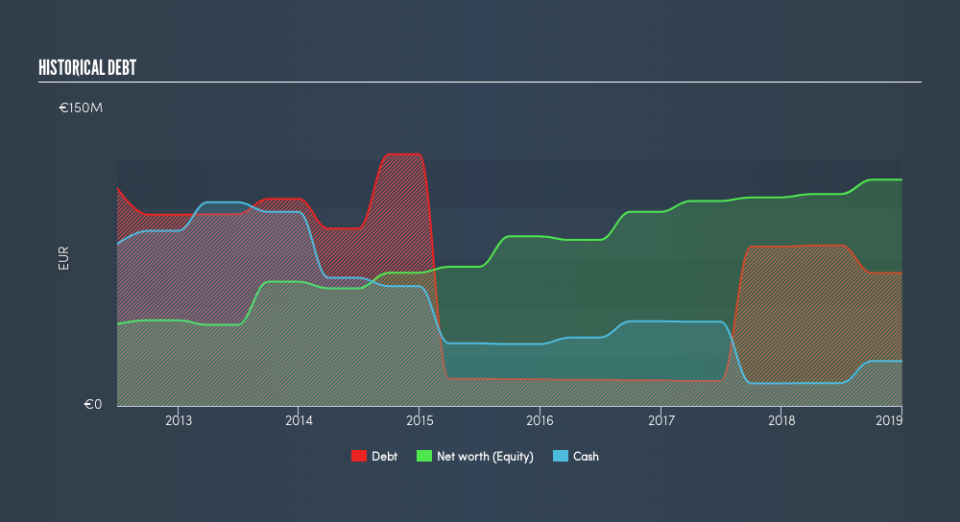What You Should Know About Hasen-Immobilien AG's (BST:ABHA) Financial Strength

Want to participate in a short research study? Help shape the future of investing tools and you could win a $250 gift card!
Investors are always looking for growth in small-cap stocks like Hasen-Immobilien AG (BST:ABHA), with a market cap of €108m. However, an important fact which most ignore is: how financially healthy is the business? Assessing first and foremost the financial health is vital, as mismanagement of capital can lead to bankruptcies, which occur at a higher rate for small-caps. Let's work through some financial health checks you may wish to consider if you're interested in this stock. However, this is just a partial view of the stock, and I suggest you dig deeper yourself into ABHA here.
ABHA’s Debt (And Cash Flows)
ABHA's debt levels have fallen from €81m to €67m over the last 12 months , which also accounts for long term debt. With this debt repayment, the current cash and short-term investment levels stands at €23m to keep the business going. Moreover, ABHA has generated €1.8m in operating cash flow over the same time period, resulting in an operating cash to total debt ratio of 2.6%, meaning that ABHA’s current level of operating cash is not high enough to cover debt.
Does ABHA’s liquid assets cover its short-term commitments?
Looking at ABHA’s €23m in current liabilities, it appears that the company has been able to meet these obligations given the level of current assets of €24m, with a current ratio of 1.05x. The current ratio is calculated by dividing current assets by current liabilities. Generally, for Real Estate companies, this is a reasonable ratio since there's a sufficient cash cushion without leaving too much capital idle or in low-earning investments.
Is ABHA’s debt level acceptable?
With a debt-to-equity ratio of 59%, ABHA can be considered as an above-average leveraged company. This is somewhat unusual for small-caps companies, since lenders are often hesitant to provide attractive interest rates to less-established businesses. We can check to see whether ABHA is able to meet its debt obligations by looking at the net interest coverage ratio. A company generating earnings before interest and tax (EBIT) at least three times its net interest payments is considered financially sound. In ABHA's, case, the ratio of 2.44x suggests that interest is not strongly covered, which means that lenders may be more reluctant to lend out more funding as ABHA’s low interest coverage already puts the company at higher risk of default.
Next Steps:
Although ABHA’s debt level is towards the higher end of the spectrum, its cash flow coverage seems adequate to meet obligations which means its debt is being efficiently utilised. Since there is also no concerns around ABHA's liquidity needs, this may be its optimal capital structure for the time being. Keep in mind I haven't considered other factors such as how ABHA has been performing in the past. You should continue to research Hasen-Immobilien to get a better picture of the small-cap by looking at:
Future Outlook: What are well-informed industry analysts predicting for ABHA’s future growth? Take a look at our free research report of analyst consensus for ABHA’s outlook.
Valuation: What is ABHA worth today? Is the stock undervalued, even when its growth outlook is factored into its intrinsic value? The intrinsic value infographic in our free research report helps visualize whether ABHA is currently mispriced by the market.
Other High-Performing Stocks: Are there other stocks that provide better prospects with proven track records? Explore our free list of these great stocks here.
We aim to bring you long-term focused research analysis driven by fundamental data. Note that our analysis may not factor in the latest price-sensitive company announcements or qualitative material.
If you spot an error that warrants correction, please contact the editor at editorial-team@simplywallst.com. This article by Simply Wall St is general in nature. It does not constitute a recommendation to buy or sell any stock, and does not take account of your objectives, or your financial situation. Simply Wall St has no position in the stocks mentioned. Thank you for reading.


